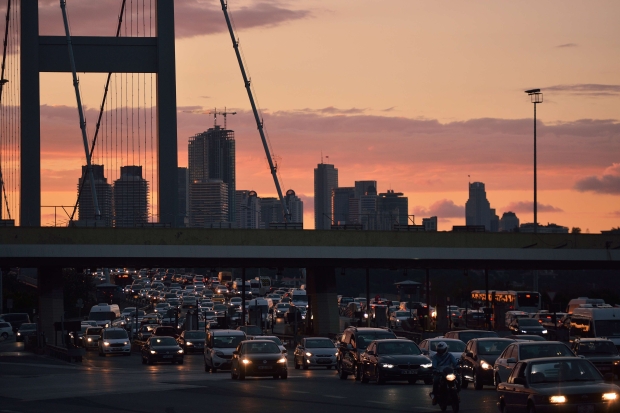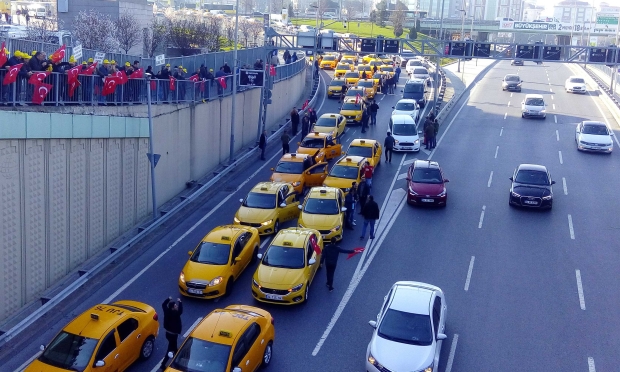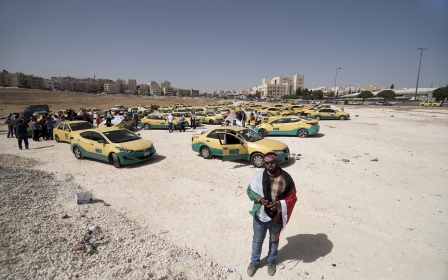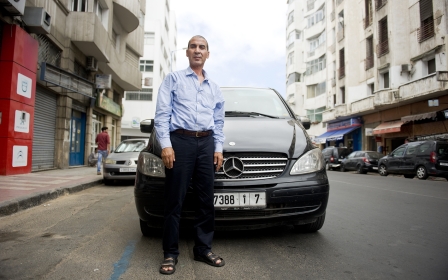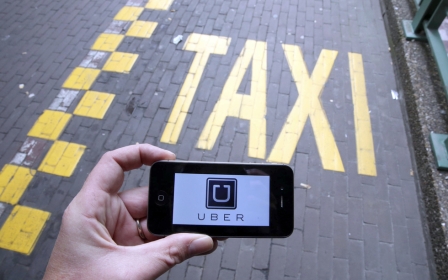'Traitors' and 'terrorists': Ride firm Uber under fire from Turkey's taxi drivers
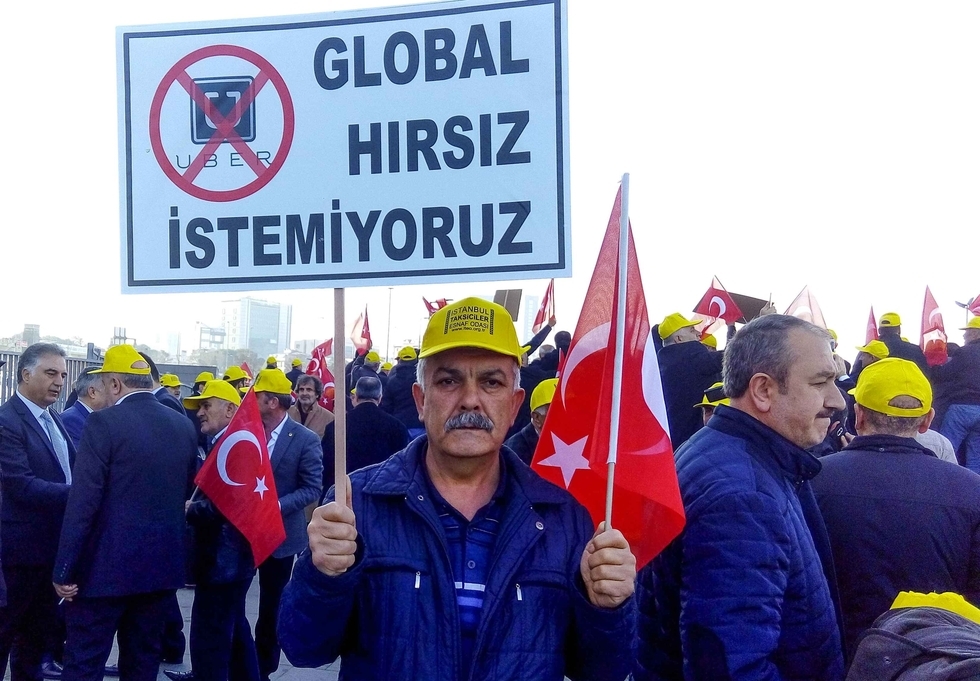
ISTANBUL, Turkey - Drivers of Uber cars and their passengers are “terrorists” and no different from Islamic State (IS) group, an Istanbul taxi representative has said, as attacks on the transport company continue amid its rising popularity.
"Uber is the same as the PKK, the same as Daesh," said Irfan Ozturk, the head of the Istanbul taxi drivers association, on Thursday. "It is officially terrorist." ("Daesh" is an acronym for the Islamic State group.)
"Uber was born in San Francisco, the place that produces the traitors who fire at my soldiers in Afrin and martyr them," Ozturk said, referring to Turkey's military incursion into the northern Syrian region of Afrin, where it has come up against the US-backed Syrian-Kurdish YPG militia. "Both those who drive Uber and use it are traitors."
Uber had yet to respond to questions from Middle East Eye at the time of publication.
Uber spots gap in the market
Uber, which launched in Istanbul in 2014 but really took off in in 2017, has spotted a gap in the market.
Turkey's biggest city has an estimated population of 16 million, but only around 17,000 taxis and near 24-hour traffic gridlock, making drivers extremely picky about which routes they want to drive.
In a landmark ruling on Thursday, a taxi driver who conned a Saudi tourist by driving all over the city instead of taking the passenger straight to the airport, was sentenced to a 15-month prison term.
No surprise then that Uber's popularity in Istanbul is growing as customers make use of more comfortable rides at lower prices (at present the company only offers its Uber XL service, which in Istanbul means larger Mercedes people carriers).
Uber has faced demonstrations from taxi drivers worldwide, including in London, Paris and New York, while some authorities have discussed banning the service.
A taxi driver who conned a Saudi tourist by driving all over the city instead of taking the passenger straight to the airport was sentenced to a 15-month prison term
But protests have rarely descended to the levels of physical violence against its drivers as seen in Turkey, including one incident which involved a firearm.
On 10 March, local media reported that four live rounds were fired at an Uber car in an Istanbul suburb. The driver was in the vehicle at the time of the shooting.
Two days earlier, an Uber driver called Alihan was hospitalised after being attacked by taxi drivers. In another instance, an Uber driver called Bahtiar was set upon by a group of 12 people and severely beaten.
At least 30 cases of attacks against Uber drivers – some of them while carrying passengers – have been reported so far this year.
In many cases, taxi drivers posing as customers order an Uber and then attack the driver, although Eyup Aksu, the head of another taxi driver association, in March claimed all these attacks were staged by Uber drivers and vowed not to let them operate.
The cost of a taxi licence
Many believe that the real problem for Istanbul's taxis is the licensing system. Vehicle registration number plates for yellow taxis sell for around 1.6m Turkish lira ($390,000).
They are often owned by people who don’t drive the taxis themselves and who instead rent them to hired drivers for a fixed amount. The result is a micro economy on which thousands of families are reliant.
Both the government and the CHP, Turkey’s largest opposition party, have sided with the taxi drivers against Uber. Several CHP MPs have even joined taxi drivers in their protests.
Istanbul also has hundreds of private mini-cab operators, who offer cheaper fixed-rate services compared to the yellow taxis, which charge according to the meter.
But private mini-cab operators have been banned for more than a decade, with severe financial penalties for drivers and their customers.
Istanbul's taxi associations say that the government should similarly treat Uber as a private cab operator. They also claim Uber's permit allows it to provide only transfer services between hotels and airports and that it is violating the law by acting as a general taxi service. In response, Uber drivers say they pay taxes and are not violating any laws.
Headaches for digital startups
Uber is not the first internet technology-based firm to run into problems in Turkey.
A court has banned Dutch-based hotel booking app Booking.com from listing Turkish hotels on its website since 30 March 2017. The ruling came after pressure from travel agencies and related firms that couldn’t compete.
But smaller, often family-run, boutique hotels say the ban has lost them business. Turkish economic officials have said they are open to negotiation: one demand is that Booking.com opens an office in Turkey.
If what Uber does is not treason, what is? People have converted their foreign currency so that the lira doesn't depreciate ...
- Irfan Ozturk, taxi driver chief
The longer-term impact of the campaign against Uber and Booking.com on future foreign investors in the Turkish market remains to be seen.
Turkish authorities have increased their efforts to reassure foreign investors that the country is an ideal prospect destination at a time when the economy has begun to falter.
The Turkish lira has hit all-time record lows over developments in the region, including rising US-Russia tensions after the suspected chemical weapon attack by the Syrian government in Douma.
But for Ozturk, Uber is a global thief that commits treason, slicing off 20 percent of each fare and sending it overseas.
Such action, he says, runs counter to government campaigns, which called on Turks to sell their foreign currency to boost the lira.
"If what Uber does is not treason, what is?" Ozturk asks. "People have converted their foreign currency so that the lira doesn't depreciate. There is no need for this global thief Uber, both its users and drivers, to shed crocodile tears now."
Middle East Eye propose une couverture et une analyse indépendantes et incomparables du Moyen-Orient, de l’Afrique du Nord et d’autres régions du monde. Pour en savoir plus sur la reprise de ce contenu et les frais qui s’appliquent, veuillez remplir ce formulaire [en anglais]. Pour en savoir plus sur MEE, cliquez ici [en anglais].


